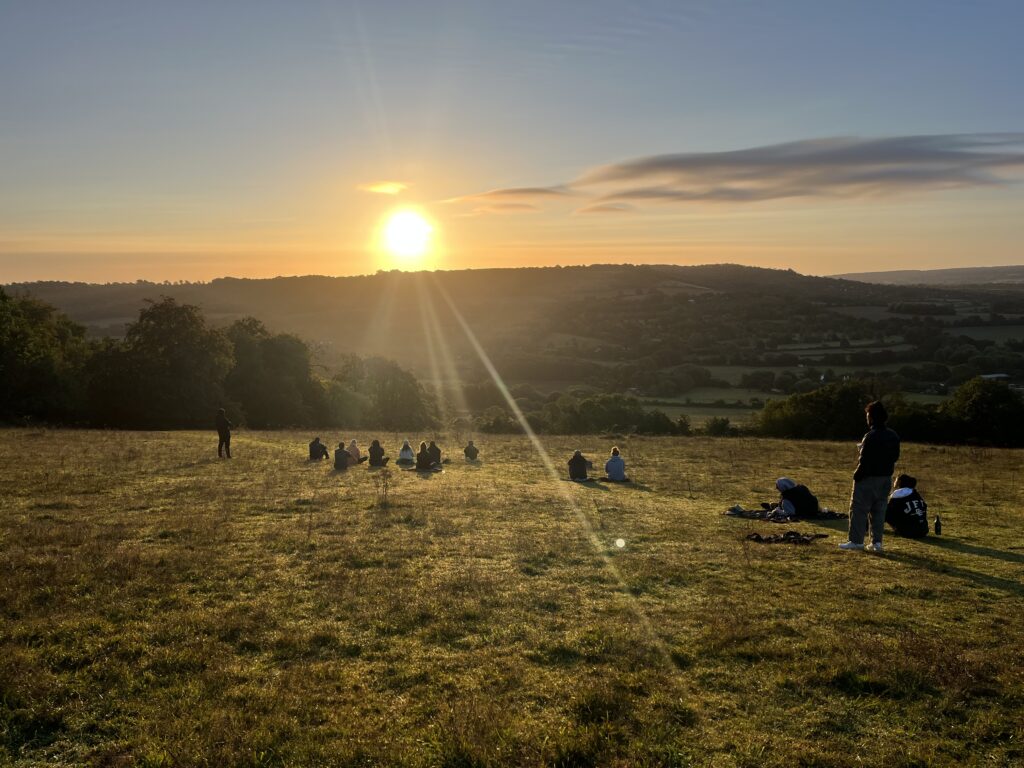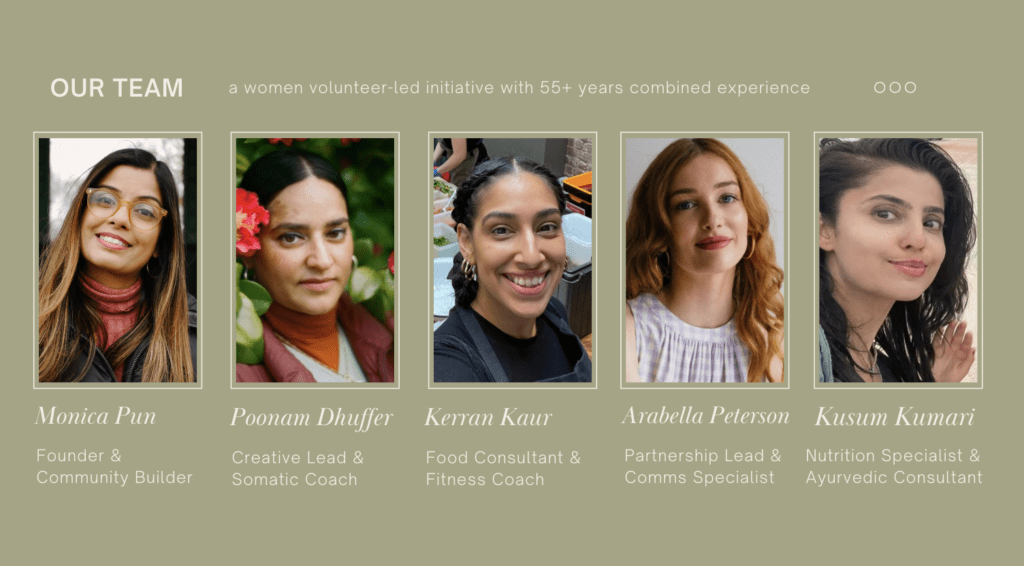Hussina Raja, Just FACT Mobiliser speaks with Monica Pun, the founder of Sacred Solitude, to understand what inspired her to start this retreat concept.
Reflections
As we embrace ourselves, and I speak of the Muslim community and People of Colour, who find themselves at the front line of organised racist and Islamophobic violence carried out by fascist groups, the need for safe spaces, community and allyship are a must. I’m reminded of a wellbeing weekend retreat I signed up for off the back of a recommendation made to me by chef, Keke Kaur, from Seeds of Wild. She spoke of its focus on getting People of Colour out into nature, and thinking about what rest and care looked like.
I found myself in the South Downs, it was beautiful! I wandered off on long walks surrounded by vast green fields, rabbit holes and the calming sound of nature, the good stuff. On one occasion, I remember walking past a home which had a sign outside for trespassers, a warning – you’d be shot if caught on the premises! It was aggressive, a violent message, territorial, one that makes me think hard about who has the right to access and enjoy the countryside. It also made me consider the fact that I encountered very few People of Colour outside of the retreat, who resided in the area. Why was it that this immensely wonderful environment was predominantly inhabited by a certain demographic, especially considering lots of migrant communities originate, and have a history of existing in rural spaces surrounded by natural beauty?
I got speaking to Monica Pun, the founder of Sacred Solitude, to understand what inspired her to start this retreat concept.
Tell us about Sacred Solitude. When and why did you start it?
During the pandemic, I realised how much of an outdoor person I am. Living in Bethnal Green, Tower Hamlets, I noticed the lack of green spaces. We have parks, but I craved forests and large outdoor countryside spaces for long-distance walking. As soon as things started to open up, I would hop on a train to places like Kent and Surrey and go for a solo hike for the day.
I always felt confident doing things like this, perhaps because my parents encouraged me to be outside when I was younger. I was also a Girl Guide growing up and loved camping.

Only 1% of visits to UK national parks come from BAME backgrounds, and 60% of BAME people in the UK are unlikely to spend time in nature compared to 30% of white people.
I slowly came to notice that many of my South Asian and Black friends felt less confident and comfortable in nature or the countryside compared to me. When I looked into the statistics, research reports showed that only 1% of visits to UK national parks come from BAME backgrounds, and 60% of BAME people in the UK are unlikely to spend time in nature compared to 30% of white people.
Considering all of this, I felt inspired to create a safe space where people of colour could connect with nature, themselves, and the community around them. I wanted to make an experience that was accessible and affordable, offering an opportunity to foster a deeper connection with the natural world and promote mental well-being in an inclusive environment.
The first retreat was piloted last year in March 2023, and since then, we’ve held two more, with the next one happening in November 2024. We also run free day hikes and are looking to hold more outdoor experiences and workshops for the people of colour community.
Why do you think Sacred Solitude is important?
Sacred Solitude provides a unique space where people of colour can explore and enjoy the natural environment without fear or hesitation. Our retreats not only help individuals reconnect with nature but also promote communal living and mental well-being.
We curate relaxed itineraries with various outdoor activities like hiking, yoga, movement and creative workshops like zine-making. Everything is optional for attendees, so there is no pressure or performative culture. Sacred Solitude fosters a sense of community and belonging, which is crucial for those who may feel marginalised in traditional outdoor settings.
People of colour are also more likely to live in urban areas and may not have the resources such as time, money and transportation to reach more remote countryside areas. Other barriers include social-economic disparities, discrimination and safety concerns within rural or remote areas of the UK.
We aim to address the barriers that often keep people of colour from accessing natural spaces, such as lack of representation – national parks and other green spaces have traditionally been depicted and perceived as spaces for white, middle-class people. People of colour are also more likely to live in urban areas and may not have the resources such as time, money and transportation to reach more remote countryside areas. Other barriers include social-economic disparities, discrimination and safety concerns within rural or remote areas of the UK.
By creating an inclusive and welcoming environment, we want to challenge the idea that nature is a privilege for a select few, ensuring that everyone can enjoy and benefit from the outdoors.
By focusing on sustainable practices and nutritious food, Sacred Solitude helps to build awareness and appreciation for the land. This perspective is critical in understanding that our actions - whether related to food choices, energy consumption, or waste management—directly impact the planet.
What do you think the role of retreats is in helping us achieve or think about a just food and climate transition?
Overnight retreats play a vital role in encouraging a deeper, personal relationship with nature, which is essential for understanding and addressing issues related to food and climate justice. By immersing participants in the natural environment over the course of three days, participants are encouraged to slow down, observe, and engage with the world around them. This fosters a sense of interconnectedness, where individuals begin to see themselves not just as visitors in nature but as guardians, and therefore an integral part of a larger ecosystem. By focusing on sustainable practices and nutritious food, Sacred Solitude helps to build awareness and appreciation for the land. This perspective is critical in understanding that our actions – whether related to food choices, energy consumption, or waste management—directly impact the planet.
The meals and food experiences at Sacred Solitude have been a highlight. We work with local chefs and organisations like Seeds of Wild to create vegetarian and vegan menus. The connection we create during meal times can inspire individuals to make more sustainable choices in their daily lives, advocate for environmental justice, and support local food systems that are equitable and sustainable.
What has been a success for you from your perspective?
One of the major successes has been the positive turnout of participants who have embraced the retreat experience wholeheartedly. Sacred Solitude has managed to attract a diverse group of attendees (83% people of colour; 69% female and 31% male) who have left feeling more connected to nature and their community. The feedback and transformations we’ve witnessed have been incredible:
“I have been to retreats before and this just felt different. I connected so easily with so many people. It was so important to experience this with other PoC especially as most spaces in the wellness area rely on our practices but don’t really feel like they include us in our entirety. I felt relaxed and seen and heard by everyone. It was beautiful”
“What I loved was being outside of London, the ease of getting there, which maximised our time relaxing, the communal meals and the fact it encouraged people to move at their pace and excuse themselves from group exercises if they wanted to”
What have the challenges been?
Securing funding and sponsorships to support and expand Sacred Solitude has been a hurdle, especially as we are a volunteer-run and not-for-profit organisation. The other main challenges have been related to accessibility, cost, and logistics. Ensuring that the retreats and day hikes are affordable and accessible to all who wish to attend has been a constant balancing act. Additionally, organising the logistics of the retreat, from transportation to accommodation, has required careful planning and resources.
What are your visions/ambitions for it in the future?
Looking ahead, I envision Sacred Solitude growing into a larger community that can offer regular outdoor experiences, including retreats, hikes, and well-being workshops in London and other parts of the UK. We hope to incorporate more educational components on sustainable living, food growing, and climate action. Expanding partnerships with organisations that share our vision for inclusivity and environmental stewardship is also a key goal.
Have you had any keen supporters?
Yes, we have received support from various individuals and organisations who believe in our mission. For example, Faith in Nature and Plantmade have been keen supporters, providing their sustainable products such as shampoos and oils for our retreats and helping to amplify our message. Such partnerships are crucial for the growth and sustainability of Sacred Solitude.
How can people support you and your vision for Sacred Solitude?
People, organisations, and brands can support Sacred Solitude by providing funding, resources, spaces or accommodation and expertise. Financial contributions can help cover the costs of running the retreats and making them more accessible to a broader audience. We’re looking to raise £3000 for our next round of funding. Additionally, volunteering time or skills can greatly enhance the retreat experience and help us achieve our goals.
About Monica Pun
Monica is the founder of Sacred Solitude, created to offer a safe and inclusive space for people of color to connect with nature and their community. With a passion for the outdoors and a commitment to promoting mental well-being, she strives to make nature accessible and enjoyable for all. Monica’s background in environmental advocacy and community building informs her work, and she is dedicated to fostering a deeper connection between people and the natural world.
If you’re interested in supporting Sacred Solitude, email Monica at monicapun26 @gmail.com.

Team: Poonam Dhuffer, Arabella Peterson, Kusum Kumari Marjara and Kerran Kaur.
